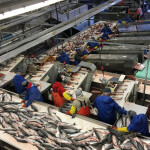The embattled U.S. Food and Drug Administration, under fire after a rash of tainted or contaminated food and other goods reached consumers, is taking the proper steps to create a more sensible imported food-safety program. Earlier this week, the federal agency announced the participants in its pilot program that will gauge the effectiveness of the growing list of third-party certification organizations.
After last year's import alert against five farmed seafood species from China made headlines, FDA brass had to come up with a solution, not just identify the problem. The agency was heavily criticized after an Associated Press report stated that only about 1 percent of all seafood imports was actually inspected at the port of entry. A shortage of funds and manpower left the agency strapped.
Secretary of Health and Human Services Michael Leavitt later said, "We can't inspect our way to safety." With imports representing nearly 85 percent of the U.S. seafood supply, truer words were never spoken. But that didn't mean the FDA couldn't do more, or do things differently, to get better results. When in need, seek help.
By choosing seven international organizations to participate in a pilot program for farmed shrimp, the agency will better understand how groups like the Global Aquaculture Alliance of St. Louis can have a positive impact on food safety.
"We believe this pilot study holds great promise for increased food safety and could prove effective in helping the FDA enhance its existing efforts," says GAA Executive Director Wally Stevens.
The GAA's Best Aquaculture Practices, which are licensed and enforced by the Aquaculture Certification Council of Kirkland, Wash., offer a comprehensive list of criteria that, if met by overseas shrimp hatcheries, farms and processing plants, can make the import process more efficient. BAP standards address environmental and social responsibility, animal welfare, food safety and traceability for shrimp farms and hatcheries, tilapia and channel catfish farms and seafood processing plants.
Starting with shrimp is also a good idea since it is the No. 1 most consumed species in the United States at more than 4 pounds per capita.
The pilot program will run through June 2009. Hopefully in that short amount of time the FDA will recognize the value of third-party certification groups in working toward a safe food supply and put a new, collaborative system in place.





